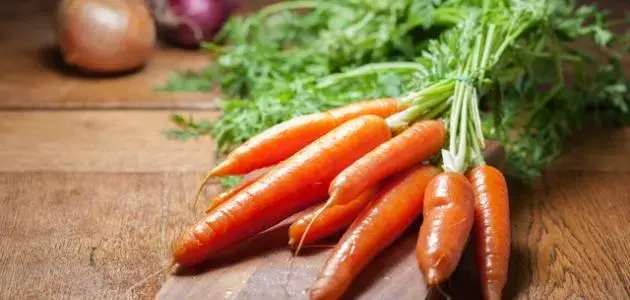Carrots are packed with several important vitamins. Here’s a quick look at what they offer:
Vitamin A
Carrots are famously rich in beta-carotene, which your body turns into vitamin A during digestion. This vitamin is key for healthy eyes, skin, bones, and a strong immune system. For better absorption, it’s best to eat carrots with healthy fats—like avocado, nuts, or seeds.
Vitamin C
Vitamin C helps support your immune system by boosting antibody production. It also helps your body absorb iron more effectively from food.
Biotin (Vitamin B7)
Biotin plays an important role in the metabolism of fats and proteins, helping your body turn food into energy.
Vitamin K1
This vitamin is essential for blood clotting and plays a role in keeping your bones strong.
Vitamin B6
Vitamin B6 helps convert food into energy and supports brain development and immune function.
Carrot Nutrition at a Glance
Here’s what you get in 100 grams of raw carrots:
- Calories: 41
- Water: 88.3 ml
- Protein: 0.93 g
- Fat: 0.24 g
- Carbs: 9.58 g
- Fiber: 2.8 g
- Sugars: 4.74 g
- Calcium: 33 mg
- Iron: 0.3 mg
- Magnesium: 12 mg
- Phosphorus: 35 mg
- Potassium: 320 mg
- Sodium: 69 mg
- Zinc: 0.24 mg
- Copper: 0.045 mg
- Selenium: 0.1 mcg
- Vitamin C: 5.9 mg
- Vitamin B1 (Thiamin): 0.066 mg
- Vitamin B2 (Riboflavin): 0.058 mg
- Vitamin B3 (Niacin): 0.983 mg
- Vitamin B6: 0.138 mg
- Folate: 19 mcg
- Vitamin A: 835 mcg
- Alpha-carotene: 3,477 mcg
- Beta-carotene: 8,285 mcg
- Lutein & Zeaxanthin: 256 mcg
- Vitamin E: 0.66 mg
- Vitamin K: 13.2 mcg
Health Benefits of Carrots
Rich in Antioxidants
Carrots contain antioxidants like alpha- and beta-carotene, lutein, and zeaxanthin. These help fight off harmful free radicals in your body and are great for your eyes. The bright orange color of carrots comes mainly from beta-carotene, which your body can convert into vitamin A.
High in Fiber
The fiber in carrots can help ease constipation and support a healthy digestive system.
Packed with Minerals
Carrots are a good source of potassium, which helps regulate blood pressure. They also provide smaller amounts of calcium and phosphorus—both important for bone health.
Quick Look at Carrots
Carrots are root veggies that come in a variety of colors—orange, yellow, white, red, even purple! The orange kind is the most common and owes its color to beta-carotene. Carrots work great in salads, soups, stews, or as a colorful side dish, adding both nutrition and flavor.
How to Keep the Vitamins in Your Veggies
To get the most vitamins out of your veggies, choose fresh produce and store it properly. Try not to wash or peel them until you're ready to eat. For storage, keep unripe fruits and veggies in the fridge in airtight containers to limit their exposure to oxygen, which can break down vitamins.
When cooking veggies, avoid boiling them for too long—water-soluble vitamins can get lost in the water. If you do boil them, use as little water as possible or try blanching (a quick dip in boiling water) to preserve crunch, color, and nutrients. You can even save the cooking water for soups to keep those vitamins from going to waste!
Leave a comment
Your email address will not be published. Required fields are marked *




